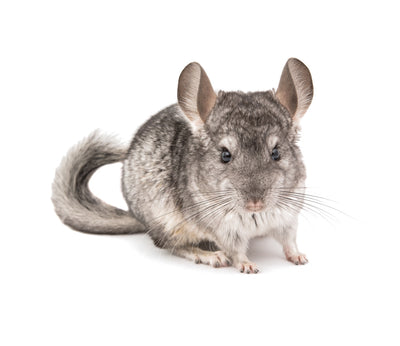
Chinchillas
Chinchillas can make wonderful pets for the right family. They are playful, friendly, cuddly and loving animals. They are active, vocal, and entertaining to watch. Since they can live up to 20 years they can be long time companions but are not recommended for young children as they require gentle and careful handling and may bite.
These adorable creatures are social animals and need a lot of interaction. A lone chinchilla requires a great deal of attention and can become very attached to its owner. If you are unable to devote that much time to your pet, it is better to have two chinchillas than one lonely unhappy pet. Two chinchillas can play and interact and not be completely dependent on their owner.
These small pets thrive in large, multi-level homes with platforms, ramps and perches for exercise and plenty of room for them to run and play. The bigger the better. Make sure it has a solid floor and good ventilation. Line the bottom of their home with carefresh natural paper bedding that is soft and comfy on their feet and quickly absorbs any liquid. Be sure to provide a dust bath for them at least twice a week, this is how they keep their fur soft and plush.
Make sure to provide your chinchilla a sleeping hut of some sort, like a wooden box or plastic igloo – somewhere it will feel safe and secure while sleeping. Chinchillas are sensitive to heat, humidity, and drafts. Extreme heat can even cause heatstroke, which can be life threatening. They do not do well when temperatures go above 78º F. You want to keep the habitat out of direct sunlight and away from heaters and other heat sources.
Because they have sensitive stomachs, Chinchillas need more consistency in their diets than most small mammals. A complete diet should consist of a good quality pellet-based food formulated specifically for chinchillas. The diet should be fortified with calcium and small amounts of vitamin C. They should only be given treats occasionally. Organic dried rosehips or dandelion leaves are a great option, but nuts, seeds and dried fruits should be avoided.
Hay provides the roughage your chinchilla needs and is a very important part of his daily diet. It also can aid in wearing his ever-growing teeth. Timothy or Alfalfa hay is a good choice. Chinchillas are naturally active around dawn and dusk, and although you can change their habits gradually, try to feed your chinchilla at around the same time each morning and night. Always make sure they have plenty of fresh water.




